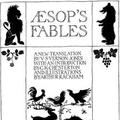THE MISCHIEVOUS DOG There was once a Dog who used to snap at people and bite them without any provocation, and who was a great nuisance to every one who came to his master's house.
So his master fastened a bell round his neck to warn people of his presence. The Dog was very proud of the bell, and strutted about tinkling it with immense satisfaction. But an old dog came up to him and said, "The fewer airs you give yourself the better, my friend. You don't think, do you, that your bell was given you as a reward of merit? On the contrary, it is a badge of disgrace. Notoriety is often mistaken for fame.

